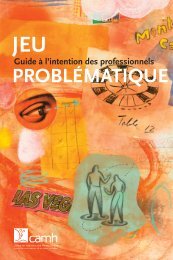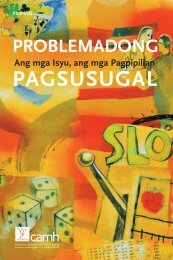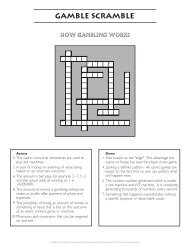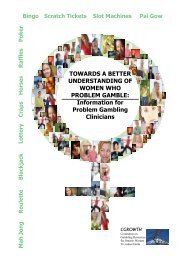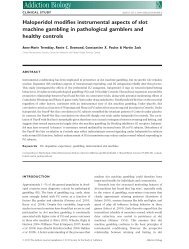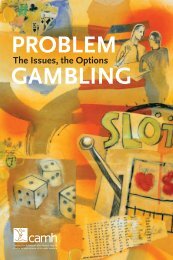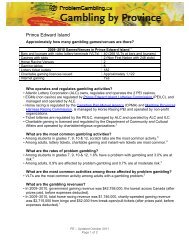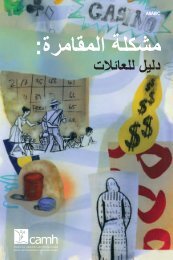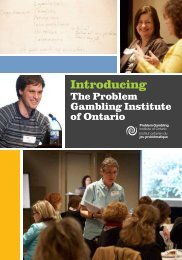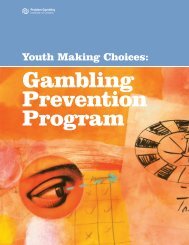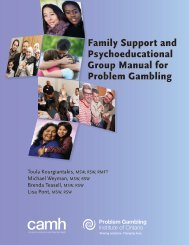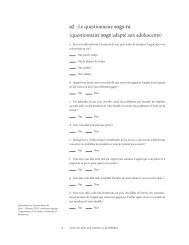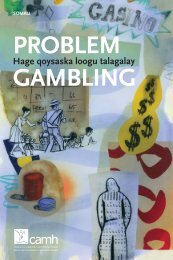Problem Gambling - A Guide for Families (PDF) - ProblemGambling.ca
Problem Gambling - A Guide for Families (PDF) - ProblemGambling.ca
Problem Gambling - A Guide for Families (PDF) - ProblemGambling.ca
You also want an ePaper? Increase the reach of your titles
YUMPU automatically turns print PDFs into web optimized ePapers that Google loves.
<strong>Problem</strong> <strong>Gambling</strong>: A <strong>Guide</strong> <strong>for</strong> <strong>Families</strong><br />
A counsellor<br />
<strong>ca</strong>n help you<br />
support the<br />
person with<br />
a gambling<br />
problem, and<br />
help you restore<br />
a healthy<br />
balance within<br />
the family.<br />
* Adapted from<br />
Makarchuk, K. &<br />
Hodgins, D. (1998).<br />
Helping Yourself: A<br />
Self-help Manual <strong>for</strong><br />
Concerned Signifi<strong>ca</strong>nt<br />
Others and <strong>Problem</strong><br />
Gamblers. Calgary:<br />
Addictive Behaviours<br />
Laboratory,<br />
University of Calgary;<br />
and Prochaska, J.,<br />
Norcross, J. &<br />
Diclemente, C.<br />
(1994). Changing <strong>for</strong><br />
Good. New York:<br />
William Morrow.<br />
how families <strong>ca</strong>n help the person change<br />
Each family is different and has its own ideas of what will help<br />
the person change. Here are some ideas that have helped many<br />
families. They <strong>ca</strong>n help you support the person with a gambling<br />
problem, and help you restore a healthy balance within<br />
the family. With the help of a counsellor, you <strong>ca</strong>n learn to:<br />
• understand the stages of change and work with them<br />
• tell the person how his or her gambling affects you and the<br />
family (But remember, yelling has probably not helped in the<br />
past, so talk to the person when you are not angry. It is important<br />
to stay <strong>ca</strong>lm when you talk.)<br />
• do not make excuses <strong>for</strong> the person, and do not protect the<br />
person from his or her own actions<br />
• take proper <strong>ca</strong>re of yourself and get your life back in balance<br />
• get your finances back in order<br />
• restore trust<br />
• get help.<br />
The Stages of Change*<br />
People with addiction problems, such as gambling, go through<br />
similar stages when accepting the need to change and when<br />
making changes. A person who gambles excessively may move<br />
back and <strong>for</strong>th between stages be<strong>for</strong>e committing to making<br />
changes. You <strong>ca</strong>n have an influence on the person’s decision if<br />
you match your support to the stage of change that the person<br />
is in. (This <strong>ca</strong>n be difficult and may take some practice. Many<br />
people find that they need the support of a counsellor.)<br />
stage 1: pre-contemplative: the person<br />
is not interested in changing<br />
At first, the person may not believe that they have a problem or<br />
do not want to make any changes. When confronted the person<br />
may deny or explain away their gambling behaviour. They<br />
may think that the problem is a lack of money or even blame<br />
others <strong>for</strong> their situation. Often, they do not want to see a counsellors<br />
be<strong>ca</strong>use they do not think that their gambling is a problem.<br />
24



